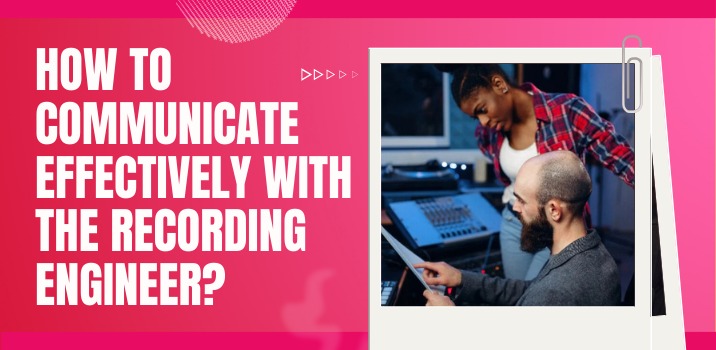How to communicate effectively with the recording engineer during a session?

22-Feb-2024
Ever wondered how your songs progress from rough drafts to polished masterpieces? The bottom line is that you should have a conversation with your recording engineer. No matter how experienced you are in the studio, communication is crucial in a recording studio with an engineer. We're going to reveal the inside scoop on how to maximise your recording session and ensure that everyone is having a great time. Let's get started on some advice to help you, regardless of your level of studio experience, realise your musical goals!
1. Establish Clear Objectives
Before you enter the studio, set your recording session goals and expectations. Clearly define the sound you're going for, any specific techniques you'd like to use, and the general atmosphere of the piece. This lays the groundwork for a focused and effective collaboration.
2. Build a Relationship
Take some time to get to know your recording engineer. Establishing a positive rapport fosters a pleasant working environment and promotes open communication in a recording studio with an engineer. Please share your musical interests, tastes, and any issues you may have. A solid working connection encourages more effective teamwork.
3. Speak the Same Language
While you may not be a technical expert, becoming familiar with basic recording terms might be beneficial. Understanding concepts like equalization, compression, and reverb will help you communicate more clearly with your recording engineer. The common vocabulary guarantees everyone is on the same page when talking about acoustic preferences and changes.
4. Provide Reference Tracks
Music is a subjective art form, and expressing sound in words can be difficult. To bridge this gap, bring reference songs into the studio that capture the sonic components you're looking for. Discussing key instances in these recordings can provide a useful reference point for your recording engineer.
5. Be Specific with Feedback
When giving feedback on takes or mixes, be as specific as possible. Instead of saying, "I don't like how it sounds," identify the aspects that require modification. Whether it's a specific instrument's volume, a guitar's tone, or the general energy of the track, clear and detailed feedback allows your recording engineer to make focused modifications.
6. Stay Open to Suggestions
While it is critical to communicate your artistic vision, you should also be receptive to recommendations and experience from the recording engineer. They bring technical expertise and a fresh viewpoint to the table. A collaborative approach frequently generates fresh ideas and improves the overall quality of recording.
7. Use Descriptive Language
Using descriptive language instead of technical words will help you express your musical ideas more effectively. Instead of saying, "Can you increase the gain on that track?" you may say, "I'd like the guitar to have a warmer and more prominent presence in the mix." This provides a more natural knowledge of your preferences.
8. Take Breaks to Revaluate
Recording sessions may be stressful, and it's easy to become immersed in the moment. Schedule time to step back and evaluate the recordings. This time apart can provide fresh ears, allowing you to return with a clearer perspective on the project's future.
9. Communicate in Real-Time
Address any issues or desires that arise throughout the session. Prompt communication allows improvements to be made on the fly, avoiding the need for extensive revisions later in the process.
10. Express Appreciation
Recognize the hard work and passion of your recording engineer. A positive and thankful attitude develops a collaborative environment and motivates the entire team to strive for success.
Conclusion
Effective communication in a recording studio with the engineer is essential for a successful recording session. Establishing clear objectives, developing a relationship, using reference songs, and providing precise feedback will help you create a collaborative environment that brings your musical vision to life. Remember that the recording engineer is an ally in the studio, collaborating with you to capture the essence of your creativity and provide a recording that reflects your artistic vision.